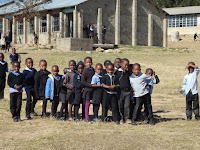 |
| Boys raise their hands, eager to participate in the session on Power in Relationships and Consent. |
I spent most of this week at Camp BRO Botha Bothe. My friend
and the local Ministry of Youth representative organized this boys’ camp to
promote gender equality and opened it up to participants from every single
school in the district! It was an amazingly good time-and my favorite of the
camps I have helped out at thus far in Lesotho. Come back on Monday for more on
Camp BRO BB!
 |
| Emily rolling her first tortillas! |
One of the best parts about Peace Corps’ Pre-Service
Training is that we try to follow the Experiential Learning Cycle throughout the training process. For example, when trainees
arrive in Lesotho, they move into a host family’s home and begin living like
Basotho immediately. Then, in their language and culture sessions, they discuss
what that is like before learning why things happen the way they do and
reflecting on the experience. Another great example of this is called HVV or
the Host Volunteer Visit. This week, all fifty-seven trainees visited currently
serving volunteers to see how we live and work in our various communities. When
they return to training, they will share and reflect on their experiences to
gain a better idea of the life of Peace Corps Volunteers throughout Lesotho. My
guest for the week was a trainee named Emily. The people in my village were-as
always-thrilled to meet another volunteer and loved when she tested out her
growing language skills by greeting them and discussing where she currently
lives. Emily, in turn, loved the chance to learn how to cook like an American
in Lesotho—especially how to bake on a stovetop and how to make tortillas!
 |
| Giving instructions to grade five in Sesotho and English. |
As always, teaching life skills is a highlight of my week
whenever I am at site. This week, sadly, I did not get to teach my oldest
students as they have begun writing their nationalized exams to complete
primary school. I taught the younger students about the physical changes that
occur during puberty. In both grade four and grade five, the teachers were
thrilled that I was discussing puberty with the children. In grade six, we had already
covered puberty, so today we
discussed HIV. Eleven students volunteered to pull an item out of my grab bag.
They then had to explain to everyone else what that item had to do with HIV
transmission. For the most part, they did a great job, however, I had them completely
stumped when a boy pulled out a spoon. It was a trick item, as a spoon has
nothing to do with HIV transmission-sharing silverware with or eating food prepared
by an HIV positive individual will not transmit HIV and ensuring everyone
understands that is just one way of trying to decrease stigma around HIV.















